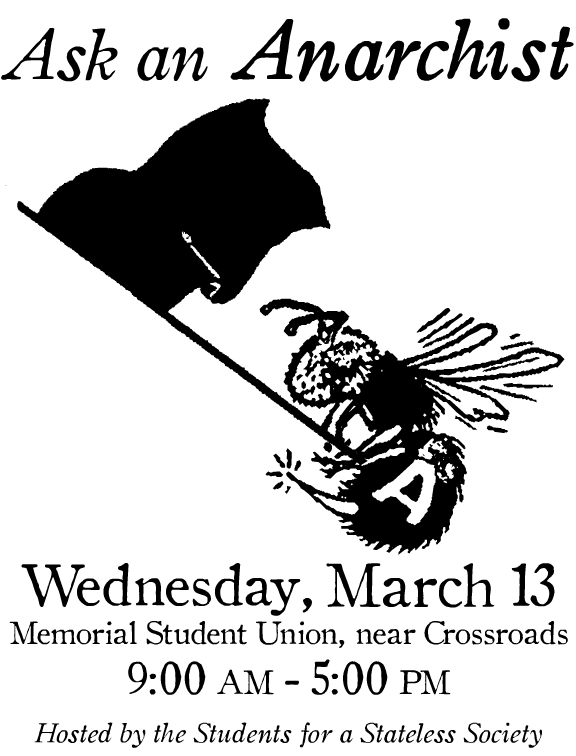tl;dr. Two beautiful new booklets are available for ordering to-day from the ALL Distro — this month’s Market Anarchy, with an article by Sheldon Richman on free-market anticapitalist approaches to privatization
, and this month’s Anarchist Classic, an 1899 pamphlet by Fred Schulder on anarchy, evolution, and free social organization. You can get one free sample copy of either series (or both) to check out, if you’re considering a monthly subscription for individual copies or monthly packs to distribute in the radical space of your choice. Sound good? You can contact me for details, or you can order directly from the Market Anarchy Zine Series and Anarchist Classics Series homepages.
Scatter tracts, like raindrops, over the land….
–William Lloyd Garrison, The Liberator, March 1831.
So it’s been a long time since I last posted an update about the ALL Distro’s monthly series to this website — since I got the new Distro website up and running, I’ve mostly kept up with the updates over there and haven’t been posting notes over here as new issues come out. Sometime soon I hope to put up a catch-up post just to give you an idea of what’s come out through the Distro over the past several months. But in the meantime: To-day, I am happy to announce this past month’s two additions to the Alliance of the Libertarian Left Distro. Let us welcome No. 22 of the monthly Anarchist Classics Series, Fred Schulder’s 1899 lecture / pamphlet on The Relation of Anarchism to Organization. And No. 35 of the monthly Market Anarchy Zine Series, Sheldon Richman’s recent essay on radical, homesteading-based alternatives to neoliberal privateering, From State to Society: How and How Not to Privatize.
|
|
This article by Sheldon Richman explores a radical libertarian, free market anti-capitalist approach to privatization — decentralized, homesteading-based alternatives to neoliberal models of corporate privatization, and a libertarian attack on capitalist privateering and government outsourcing masquerading as free-market reforms.
“It’s not privatization per se, but free competition through voluntary exchange, that is desirable. It matters little whether the government calls people who perform its functions public employees or private contractors. When a company becomes a monopoly government contractor, to that extent it is an arm of the state rather than a private firm. For that reason such ersatz ‘privatization᾿ devices as contracting out the operation of prisons and charter schools merely blur the line between ‘private’ and ‘public’ sector – in the nature of corporatism – and undermine the case for the genuine divestiture of stateheld assets. . . .
“Since government possession of state assets originated in one form of usurpation or another, the requirement that they be bought back is unjust. It may be argued that the revenue could be used to benefit the general public . . . but political incentives tend to work in the other direction. Politicians will see the new revenue as an opportunity to launch new programs that offer benefits to well-organized interest groups. . .
“Better, then, that state assets be seen as existing in a state of nonownership . . . and opened to homesteading . . . . Government elementary and secondary schools could be turned over to the people who work in them or the students’ parents, or both groups, who would be free to decide how to run them — without tax money. A government university could become the property of its students, members of its faculty and staff, or both. Some schools might organize as joint stock companies with tradable shares, while others might become consumer or producer co?@c3;b6;peratives. Competition would determine which forms best satisfied consumers and attracted capable producers . . . .’
$1.00 for 1; 75¢/ea in bulk.
|
|
|
This odd little classic from Fred Schulder (1874-1961) — the individualist anarchist writer, lecturer, and sometime traveling salesman from Cleveland, Ohio — is a discussion of anarchy, the theory of evolution, the role of free association and property in an anarchic society, and the emergence of positive social organization. The lecture reprinted in this chapbook was originally delivered by Fred Schulder at the Franklin Club, a social and intellectual discussion group in Cleveland, Ohio, on September 18, 1898. The next year, Schulder was persuaded to prepare his club lecture for publication in pamphlet form by his friend, the renowned printer Horace E. Carr.
"Organization has been defined as the taking on of organic structure. . . . Evolution is a series of changes, under natural law, from a diffused, uniform and indefinite arrangement, to a concentrated, multiform and definite arrangement. . . . Organization proceeds according to the same inevitable laws, and . . . constitutes the evolution, not only of living beings, but also of all communities, societies, and society in general . . . . Organization is the law of life — of development. It is true that in union there is strength, but in organization there is still more strength. . . .
"Anarchism may be defined as the doctrine that the liberty of every individual shall be limited only by the equal liberty of every other. . . . We can find nothing in organization itself, which is a denial of equal liberty. Men [sic] may, and where they find it advantageous, in fact do combine and organize, without being forced to do so. And such organization will persist under liberty, so long as the individuals composing it find it to their advantage. Society at large is such an organization . . . The organization may be in its incipient stage, but the development is going on as fast as antagonistic forces will permit. . . Under liberty, however, this difficulty will continue to grow less; men [sic] will ever more realize their mutual dependence, and this must increase with the development of the social organism. And realizing this mutual dependence, they will adjust these minor differences according to their intelligence!!!@@e2;20ac;af;—!!!@@e2;20ac;af;an adjustment which government often prevents. . . .
"What the anarchist objects to in the state is not the Element of organization but the element of government. Through the instrumentality of the state some individuals acquire a monopoly of opportunities, some of which are absolutely necessary to the production of wealth, and others very helpful to it – monopolies which are unthinkable in the absence of government, and which enable their holders to extract from the producer a tribute. Such is the fruit of organized robbery. And again, anarchism is opposed, not to the organization, but to the robbery. While any particular government, according to the laws of organization, tends to grow and become stronger until it loses its adaptation to its surroundings, government in general is losing the adaptation to its surroundings, and is undergoing a change in the direction of dissolution."
$2.00 for 1; $1/ea in bulk.
|
Now as I’ve mentioned before, both the Market Anarchy Zine Series and the Anarchist Classics Zine Series are regular monthly publications, with one issue each being sent out each month. You can always order individual copies online from the Distro page, but if you’d like to save on shipping & handling charges, and to get new orders as soon as they come out, you can always sign up for a regular subscription. Subscriptions can be for personal reading, or for discounted bulk orders of material for distributing, tabling, or for stocking your local infoshop and other radical spaces. I’m happy to say that in the past few months I have added online subscription forms, so that you can set up half-year or full-year subscriptions directly from the Market Anarchy Zine Series and Anarchist Classics Zine Series homepages.
Alternatively, if you’re considering subscribing you can also contact me to request a free sample copy for you to check out, compliments of the Distro; then, if you like it, continue the subscription for the rest of the year at the following rates (all prices already include any shipping and handling costs):
| Market Anarchy Zine Series |
|
Individuals |
Bulk Distribution Packets |
$1.50/issue
(= $18/year) |
No. of copies !!!@@e2;153;2022; 80¢/issue
(= N !!!@@e2;153;2022; $9.60/year) |
| Anarchist Classics Zine Series |
|
Individuals |
Bulk Distribution Packets |
$2.25/issue
(= $27/year) |
No. of copies !!!@@e2;153;2022; $1.25/issue
(= N !!!@@e2;153;2022; $15/year) |
For details on all your options (including ready-to-print electronic versions, customizations of booklets with local contact information for your ALL chapter or local Anarchist activities, discounts for receiving quarterly shipments, etc. etc. etc.), see Market Anarchy Mailed Monthly. If you decide not to continue the subscription, the sample issue is yours to keep. Intrigued? Contact me forthwith, and we’ll get something worked out.
That’s all for now. In December we’ll be dropping some more science; until then–enjoy the Anarchy!







